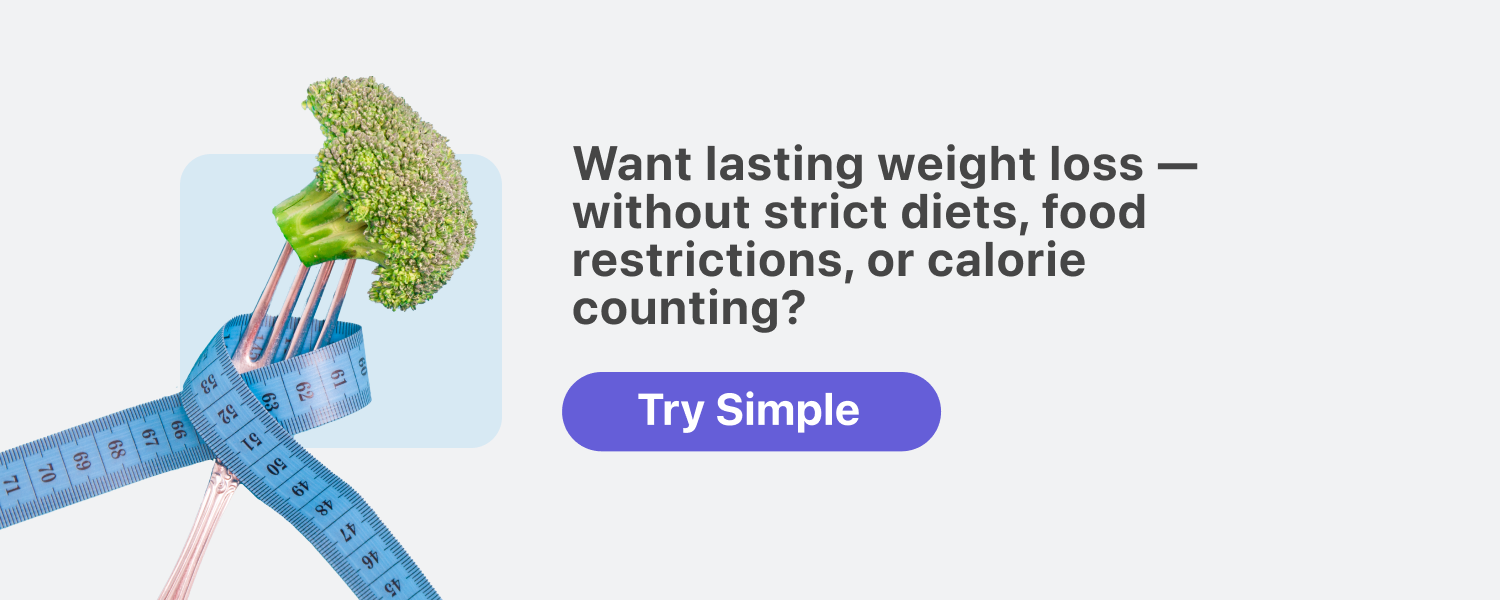How to motivate yourself to lose weight

So, you’ve taken charge of your health and are ready to start a weight loss journey. Good for you!
The first few days might be a breeze. You’re engaged and inspired! You’re winning every meal!
But then … things get tough.

Maybe you wake up feeling blah about your goal. Maybe there’s a wedding, birthday party, or bar mitzvah, and you want to enjoy a good meal. Maybe you have a busy day, or your kid gets sick, or you have to travel, or another life obstacle happens.
Whatever the reason, finding the motivational magic starts to feel much harder.
In this article, we’ll give you some psychology secrets to help you stay motivated — and take the right action anyway, even if you don’t feel like it.
Looking for a little extra motivation on your wellness journey? From hydration reminders to meal insights, let Simple be your companion and cheer squad. Start by taking our quiz now!
What are the different types of motivation?
Motivation is divided into two categories: intrinsic (or internal) and extrinsic (or external).[1]
Internal / intrinsic motivation
Internal (aka intrinsic) motivation comes from within. Internal rewards that make you genuinely happy power your inner motivation.
For example, when you lose weight to feel more confident, to tackle a challenging project that inspires you, or to lower your risk of certain diseases, you’re internally motivated. These rewards motivate you because they make you feel good about yourself, they feel truly meaningful, and/or they align with your deeper values.
External / extrinsic motivation
External (aka extrinsic) motivation is based on receiving external rewards or recognition, such as other people saying “Good job” or winning a competition.
Often, these are “if / then” scenarios, like “If I can fit into a certain pant size, then I will be happy.” The pants are the external motivator linked to happiness.
Both internal and external rewards can get you started on a weight loss journey, but only internal rewards support long-term progress.
Kickstart weight loss with external rewards
Although they tend to fade out over the long term, external rewards can be a good short-term goal focus — maybe even a fun challenge.
For instance, you might try something like:
- If I go to the gym three days a week for a month, I’ll buy myself that pricey new pair of running shoes I’ve been eyeing.
- I’ve signed myself up for a 5k charity walk in six weeks. Guess I better start practicing with my walks around the block!
- If I cook at home for two weeks instead of getting takeout, I’ll eat healthier — and I’ll have saved enough money to splurge on a nice restaurant.
Some external rewards and challenges can spark your curiosity and encourage you to try new things.
For instance, let’s say those walks around the block inspire you to tackle more challenging routes. You then try a local hiking trail. A year later, you find yourself on an awesome backpacking trip that you’d never have considered today.
In other words, what was an external reward to learn new skills or create motivation and accountability can become your inner motivation to pursue a new activity you genuinely enjoy.
Stay motivated to lose weight with internal motivation
With internal motivation, the actions you take are naturally satisfying to you. They spring from a desire to learn, grow, and actualize your potential.
Because of this, internal motivation is ideal for sticking to longer-term goals, especially when those get challenging.[2]
As you hit milestones along your journey, your internal motivation will create unique moments for you to feel proud, excited, and focused on the path ahead. And, as you encounter the inevitable problems and setbacks, internal motivation will make you feel more accomplished when you work through those (rather than feeling like evidence of failure).
When you’re internally motivated, you’re more likely to be creative and a better problem solver.[3]
When you find new ways to lose weight, build a customized diet plan, research fun recipes, or try new hacks to lengthen your intermittent fast, you’re being creative. As you pursue your long-term goals, internal rewards are your key to finding innovative and enjoyable ways to motivate yourself to lose weight.
Harness the power of your internal motivation with the Simple app. Dive deep into innovative recipes, explore diverse nutrition plans, and access a trove of resources tailored to your weight loss journey. When motivation meets innovation, the possibilities are endless. Are you ready to channel your inner creativity? Start with our Simple quiz now!
Life hacks to tap into your internal motivation

1. Know your deeper “why”
In other words, ask yourself, “What’s really driving me to change my habits and lose weight?”
Knowing what’s truly inspiring you can help you stay focused when things get challenging.
To do that, you can try a simple exercise: the 5 whys.
Start by asking yourself, “Why do I want to lose weight?” (Or change my habits, or eat more nutritiously, or get more active, or whatever.)
Then, once you get an answer, ask yourself why again.
For instance:
Why do I want to lose weight?
I want to lose weight because I just saw a photo of myself and didn’t like it.
Well, why didn’t I like it?
Once you get an answer, ask yourself why again.
I didn’t like it because I didn’t like how I looked.
Why didn’t I like how I looked?
And so on, until you’ve asked yourself “why” 5 times. Another way to ask this question is, “What about this is good / bad for me?”
Why do I want to lose weight?
I want to lose weight because I just saw a photo of myself and didn’t like it.
What exactly about that photo bothered me?
By the time you get to the fourth or fifth answer, you’ll have a pretty good idea of what’s driving you. For instance, maybe you end up with:
In the photo, I look like my parent, who had type 2 diabetes when they were my age, and I’m scared this might happen to me.
In the photo, I’m out of breath because I just did a long hike, and I was out of shape. I want to be in shape and feel energetic again.
Again, once you know what’s truly driving you, the more you can return to that motivation when you need it.
2. Write your whys down and review them often
Once you define all the reasons why you want to lose weight, write them down. Or create a vision board that captures those motivations.
In other words, somehow capture and record those reasons. This will help remind you of what you’re working toward.
Then, review your whys as often as possible. (For instance, stick a note on your bathroom mirror so you see it every day.)
This can help keep motivation top of mind.

3. Get curious
Your inner motivation is sparked when something in your life grabs your attention and persuades you to learn more. Try doing a little research about a topic that interests you.
For instance:
- Like cooking? Can you challenge yourself to make new kinds of healthy meals?
- Like science? Can you teach yourself the various intermittent fasting schedules or research the systems of your body that may benefit from diet and exercise, like cell autophagy?
And so on.
When you stimulate your brain with new information, you can trigger an interest that powers your internal motivation.
4. Set SMART behavior goals
Rather than setting outcome goals (like losing a certain amount of weight), set behavior goals. In other words, focus mostly on what actions you’ll do consistently to work toward your goal.
Ideally, focus on what you’ll do each day or each week to stay moving in the direction you want.
You can use the SMART goal process to figure out what this could be.[4]
- Specific – What exactly will you do each day (or most days) to work toward your goal? How exactly will you do it?
- Measurable – How will you know you’ve done the thing? For example, “I will drink two glasses of water” is better than “I’ll drink more water.”
- Attainable – Look for behaviors that are a slight stretch but not too much. For instance, one more glass of water a day or one more serving of vegetables.
- Relevant – Each behavior goal relates to your weight loss journey or the overall task at hand.
- Time-based – Each behavior goal has a deadline or a time to quantify progress, e.g., “Each day, I will ___” or “By the end of the week, I will ___.”
5. Document your weight loss journey — and focus on the wins
If you find yourself stuck mid-journey, look back at how far you’ve come. Reflect on the small improvements or wins, no matter how tiny they seem.
Document your weight loss journey with before and after photos, or keep a journal as a reminder of your success. Look for NSVs or “non-scale victories” — all the little daily-life successes that don’t show up on the scale.
If you want a more tech-friendly journal option, why not use Simple’s “Meal Tracker” feature to keep a record of your meals?
6. Find a buddy
Other people can support us, guide us, cheer us on, and hold us accountable. And helping and supporting others can increase our own internal motivation.[5,6]
Plus, a fitness partner can make tough workouts more enjoyable and help hold you accountable for your success. By cheering on a friend, you both can find the motivation you need to crush your goals.
Check out our Simple Facebook group to find a supportive and helpful community!
7. Share your wins

In a related hack, share your successes and victories — again, no matter how small. Sharing these — for instance, in a social media post or texting a progress photo to a friend — can make them feel more “real.”
8. Plan for challenges and setbacks
No matter how motivated you are, you will run into problems and setbacks. It’s absolutely normal! So, plan for them.
Ask yourself:
- What could reasonably go wrong in this process? (e.g., I have to work late, I forgot my running shoes, I’m traveling, etc.)
- How could I prepare myself with a “Plan B” or workaround?
- How can I plan to get back on track as soon as possible after I find myself drifting away from my goals?
9. Be kind to yourself
Self-compassion and being a friend to yourself have been shown to work much better than self-criticism.[7]
This doesn’t mean “anything goes,” but rather that you’re encouraging, positive, and helpful to yourself while being honest — just like you’d be with a good friend.
10. Do the right things anyway.
You’ll often have days where you don’t “feel like” doing the actions you established for yourself in your SMART goal setting.
Do them anyway, recognizing that you don’t have to “feel motivated” to do what matters. After all, you aren’t “motivated” to brush your teeth or clean out the cat litter box, right?
Focus on simply doing the actions that move you in the right direction and help you care for yourself, regardless of the emotions that pop up around them.

Frequently asked questions about motivation and weight loss
Staying motivated is crucial because weight loss can be a challenging journey. Motivation keeps you focused, helps you overcome obstacles, and maintains your commitment to your goals.
Yes, rewards can be effective. However, focus on non-food rewards that align with your goals, like buying new workout clothes, treating yourself to a massage, or spending time on a hobby you enjoy.
Establishing a routine creates consistency, which is key for motivation. When healthy habits become part of your daily life, they require less mental effort to maintain.
Self-care is essential. Prioritize sleep, manage stress, and engage in activities that bring you joy. When you take care of your overall well-being, you’re better equipped to stay motivated.
Practice self-compassion. Understand that setbacks happen and negative thoughts are normal. Challenge these thoughts with positive affirmations and focus on your progress.
Motivation can fluctuate. When it dips, remind yourself of your reasons for starting. Reflect on past successes and remind yourself of how far you’ve come. Revisit your goals and find new sources of inspiration.
Remember, motivation is a journey, not a destination. Be patient with yourself and celebrate every step forward, no matter how small. The process of staying motivated is as important as the ultimate goal of successful weight loss.Embrace a world of encouragement with the Simple app! From personalized nutrition feedback to those little nudges when you need them most, we’ve got your back. Ready for a new day in your weight loss journey? Take the Simple quiz now!

- Di Domenico SI, Ryan RM. The emerging neuroscience of intrinsic motivation: A new frontier in self-determination research. Front Hum Neurosci. 2017 Mar 24;11:145.
- Jovanovic D, Matejevic M. Relationship between rewards and intrinsic motivation for learning – researches review. Procedia – Social and Behavioral Sciences. 2014 Sep 5;149:456–60.
- Auger P, Woodman RW. Creativity and intrinsic motivation: Exploring a complex relationship. J Appl Behav Sci. 2016 Sep 1;52(3):342–66.
- Bailey RR. Goal setting and action planning for health behavior change. Am J Lifestyle Med. 2019 Nov-Dec;13(6):615–8.
- Doré BP, Morris RR, Burr DA, Picard RW, Ochsner KN. Helping others regulate emotion predicts increased regulation of one’s own emotions and decreased symptoms of depression. Pers Soc Psychol Bull. 2017 May;43(5):729–39.
- Zaraska M. Growing young: How friendship, optimism and kindness can help you live to 100. Hachette UK; 2020.
- Rahimi-Ardabili H, Reynolds R, Vartanian LR, McLeod LVD, Zwar N. A systematic review of the efficacy of interventions that aim to increase self-compassion on nutrition habits, eating behaviours, body weight and body image. Mindfulness. 2018 Apr 1;9(2):388–400.
